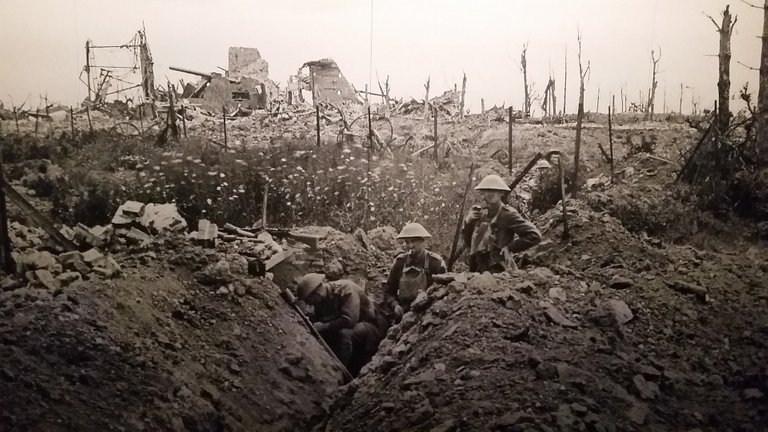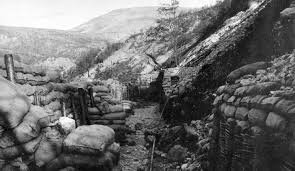
' It was 9am and the trench was full of corpses and all sorts of equipment. We stood and sat on bodies as if they were stones or logs of wood. Nobody worried if one had its head stuck through or torn ogf, or the gory bones stuck through or torn off coat. Outside the trench one could see them lying in every kind of position.'
Words of a British expeditionary force soldier. 1914.
The first trenches on the Western front, were dug out of immediate need on the battlefield. Then as the race to the sea blazed west and north, those hastily constructed temporary defences join up and became something permanent. By December 1914 each side had its own lines of trenches, stretching 475 miles from the North sea at Dixmuide to Belfort on the Swiss Border. 11 Million French and Belgian citizens remainded trapped helplessly behind German lines, subject to cruel discipline and deprivation. The Germans hsd also captured most of France's coal mines snd heavy industries.
In the early stages of the war, the German trenches were superior to the Allies, with more use made of concrete blockhouses and shelters that could descend some 4 storeys below ground. The Germans were to hold their positions and captured ground. The Allies needed to move forward and liberate that ground, driving the Germans back to their borders. They expected to shift position and built with less sense of permanence.

The first fighting lines of trenches were around 12 foot deep, but could be quite a bit shallower. BEF units name their trenches, sarcastically as they really suffered there, but names like 'Parklane' or 'Mayfair'. In a typical year, a British soldier could expect his unit to spend about 15% of the time at the sharpest end of the trench system and in the greatest danger.
Typhoid, cholera, Trench fever and Dysentery soon became commonplace. This was fed by overflowing latrines or the rotting of unburied dead. Almost everyone was infested with head and body lice. Fungal infections like trench mouth or trench foot proved to be daily torture. Untreated, these could yurn gangerous and required amputation. Rain for much of the year filled the trenches up the bottoms. Rats ran rampant eating the dead and causing other problems. Some soldiers commit suicide in those trenches.

We can clearly see that the German's concrete trenches were so advanced. Imagine the Allies bearing all that and still fight for king and country. They were definitely not prepared for war.
Sources : Wikipedia, National Geographic, War Magazine collection, Own Content, Pixabay, Google Images.
terribly sad, and they all hoped that it would be the war to end all wars. their hopes were in vain because the nature of man does not change.
Congratulations @ruthofisrael! You have received a personal award!
Click on the badge to view your Board of Honor.
Do not miss the last post from @steemitboard: